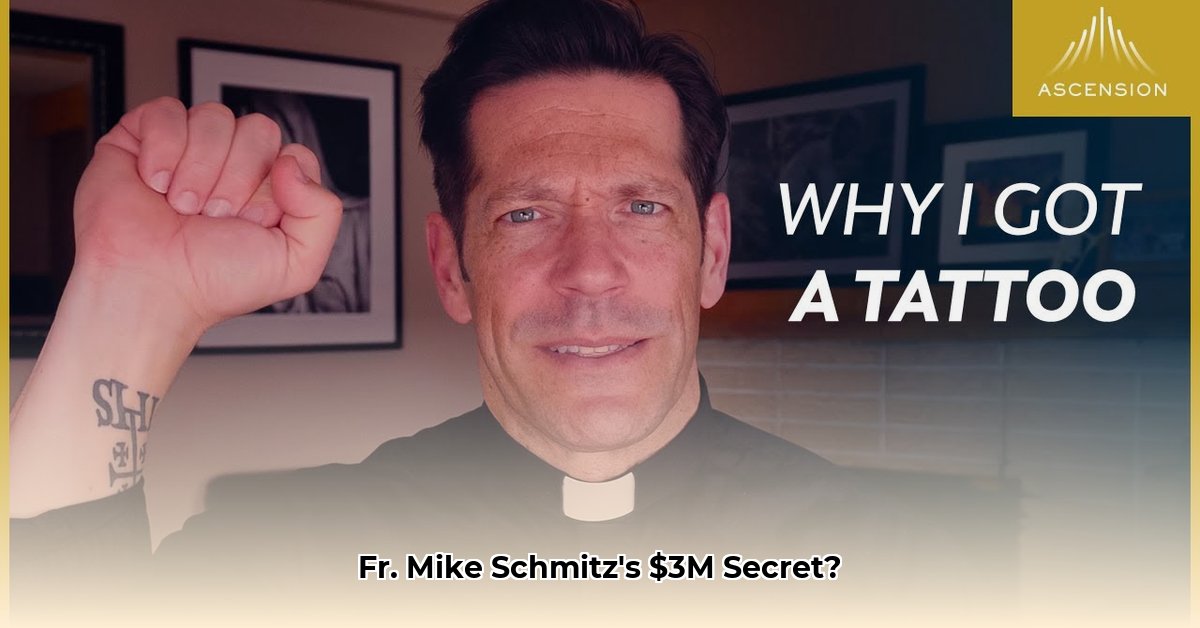
Fr. Mike Schmitz's Financial Success: A Multifaceted Ministry
Father Mike Schmitz has become a prominent figure in the Catholic Church, leveraging podcasts, YouTube, and books to connect with millions. This has naturally led to questions about his financial success, with estimates placing his net worth at approximately $3 million. This article explores the sources of his wealth, the ethical considerations involved, and the challenges of balancing religious ministry with a significant media presence. Understanding Fr. Schmitz’s financial landscape requires examining his multi-platform approach and the complex interplay between faith and finance in the digital age. For comparison, see information on other religious leaders' finances here.
Building a Multi-Platform Ministry: The Foundation of Success
Fr. Schmitz's influence extends across various digital platforms. His immensely popular "Bible in a Year" podcast has garnered a massive following. His YouTube channel, boasting over 670,000 subscribers, provides another significant avenue for outreach. Further enhancing his reach are substantial social media followings on platforms like Instagram and Twitter. Finally, his book sales contribute significantly to his overall success. This multi-pronged strategy demonstrates a keen understanding of modern media and its potential for reaching a broad audience. But how do these platforms translate into a multi-million dollar net worth?
How substantial is the income generated by podcast sponsorships for his highly successful show? And what are the precise sales figures for his books and the fees he receives for speaking engagements? The lack of readily available data concerning the specific breakdown of his revenue streams underscores the need for further transparency. This lack of complete information makes it challenging to precisely quantify the contribution of each element to his overall net worth.
Navigating the Ethical Tightrope: Faith, Finance, and Transparency
The intersection of faith and financial success presents complex ethical considerations. Religious leaders, even those with a largely positive online presence, must carefully consider the potential for conflicts of interest when engaging in commercial activities. Fr. Schmitz's substantial net worth necessitates a discussion about accountability and transparency. The handling of donations, mechanisms for preventing misuse of funds, and the overall ethical framework governing his operations demand careful scrutiny. These are not easily answered questions, requiring an in-depth examination that extends beyond simply reporting an estimated net worth. How can a religious figure maintain alignment with traditional values while navigating the modern media landscape?
Dissecting the Income Streams: A Preliminary Analysis
While precise figures are currently unavailable, several likely income sources contribute to Fr. Schmitz's estimated net worth:
Podcast Sponsorships: The popularity of "Bible in a Year" likely generates substantial revenue through sponsorships from various companies.
Book Royalties: His well-received books undoubtedly generate significant income through royalties earned from sales.
Speaking Engagements: Fr. Schmitz's frequent engagements as a speaker at various events contribute considerably to his earnings.
Online Donations: A considerable portion of his financial support could stem from online donations from his dedicated audience and supporters.
The absence of detailed public financial information is a significant factor in assessing the ethical considerations that arise in combining faith-based work with commercial enterprises.
The Path Ahead: Transparency and Ethical Considerations
The future of Fr. Schmitz's ministry and its financial implications remain an unfolding narrative. A greater emphasis on financial transparency would benefit not only his audience but also alleviate potential ethical concerns. Publicly disclosing donation information or implementing a clear financial reporting system would foster trust and address anxieties about the management of funds by fostering trust and accountability.
The establishment of a dedicated charitable foundation could also provide a more formal and transparent approach to managing donations and ensuring that resources are used for their intended purposes. This is one key method of addressing the concerns surrounding the financial side of faith-based ministries.
Ultimately, this discussion extends beyond the specifics of Fr. Schmitz’s financial situation. It highlights the inherent challenges in balancing spiritual leadership with commercial success in the online world. The journey toward greater transparency and ethical practices is an ongoing process demanding responsible stewardship and accountability.
Maintaining Financial Transparency: A Framework for Religious Influencers
Key Takeaways:
- Fr. Mike Schmitz’s success leverages multiple media channels, creating broad reach and influence.
- His net worth, though not publicly available, arises from multiple income streams.
- The ethical implications of financial success for religious figures demand careful consideration.
- The challenge of balancing ministry and media necessitates thoughtful planning and ethical guidelines.
- Building and maintaining trust hinges on commitment to transparency and accountability.
The Importance of Transparency in Religious Influence
Fr. Schmitz's prominence in the digital realm underscores the need for transparency in religious influence. While his specific net worth remains undisclosed, the potential for financial success in this domain requires a robust ethical framework. The lack of publicly available data about his finances highlights the importance of open and honest communication as a foundation for building and maintaining trust with an audience that values transparency and integrity. How does one successfully navigate the complexities of combining faith and finance in the modern day?